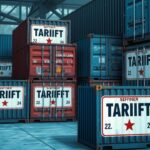Economy
Politics
AMIT KHANDELWAL, ASIA, CHINA, CONSUMER BEHAVIOR, DONALD TRUMP, ECONOMICS, ECONOMY, FINANCE, HONG KONG, KHANDELWAL, KIMBERLY GLAS, MASSACHUSETTS, MEXICO, NATIONAL BUREAU OF ECONOMIC RESEARCH, NATIONAL COUNCIL OF TEXTILE ORGANIZATIONS, NORTH AMERICA, NPR, SHE, SHEIN, TEMU, TRADE, TRUMP, U. S, YALE UNIVERSITY
Nia Simpson
Trump Closes Trade Loophole Affecting Low-Cost Chinese Goods to U.S. Consumers
President Trump closed a loophole facilitating tariff-free purchases of goods from China and Hong Kong, introducing a 30% tariff on low-value shipments. This move, supported by industry groups, aims to protect U.S. manufacturers and address concerns over smuggling. Despite anticipated challenges in processing, the administration hopes to extend these measures globally, significantly impacting costs for consumers, especially those with lower incomes.
Recently, President Donald Trump addressed a significant trade loophole that permits American consumers to purchase low-cost goods from China and Hong Kong without incurring tariffs. This loophole, utilized by e-commerce giants like Shein and Temu, allowed shipments valued at $800 or less to bypass import fees and customs inspections. However, under an executive order signed on Wednesday, this exemption will be eliminated starting May 2, imposing a 30% tariff on these items with a minimum fee of $50.
Organizations such as the National Council of Textile Organizations, led by President Kimberly Glas, have advocated for closing the de minimis exemption, emphasizing the protection it offers U.S. manufacturers. Glas noted, “We are really pleased,” citing the move as a significant advancement for domestic industries. Critics argue that this adjustment may detrimentally affect many consumers, particularly low-income individuals who rely on online shopping to minimize costs.
A study from the National Bureau of Economic Research suggests that annual costs for consumers could increase by $10.9 billion to $13 billion as a result of the new tariffs, disproportionately impacting lower-income households. Amit Khandelwal from Yale University stated, “Lower-income consumers take advantage of de minimis shipments disproportionally more than richer consumers.”
This effort to eliminate the de minimis loophole has garnered bipartisan support, reflecting concerns regarding public safety and fair trade competition. In a previous letter, 126 House Democrats urged former President Joe Biden to apply stricter regulations on direct shipments, highlighting the volume of packages entering the U.S. without proper scrutiny.
Industry stakeholders assert that these unrestricted shipments create an uneven playing field for American manufacturers. Additionally, there are concerns regarding the potential smuggling of narcotics, such as fentanyl, among the daily influx of packages. The executive order specifically cites fentanyl as a crucial factor in closing this loophole, affecting 30-40% of low-cost international shipments.
The administration aims to extend these restrictions to encompass low-cost shipments from other countries beyond China and Hong Kong, with Glas indicating that Congress may be receptive to broader action. However, the logistics of processing and imposing tariffs on a billion shipments annually pose significant challenges that require substantial infrastructural investments. Trump had previously attempted to close this loophole, but logistical setbacks had halted progress. In his latest order, he asserted that the necessary systems are now in place to enforce these changes effectively.
In summary, President Trump’s recent executive order to close the trade loophole for de minimis shipments from China and Hong Kong aims to protect American manufacturers while addressing security concerns related to smuggling. This measure imposes new tariffs that may increase consumer costs significantly, particularly affecting low-income individuals. The government underscores the need for appropriate systems to manage tariff collection, as it anticipates bipartisan support for broader restrictions on low-cost imports.
Original Source: laist.com








Post Comment